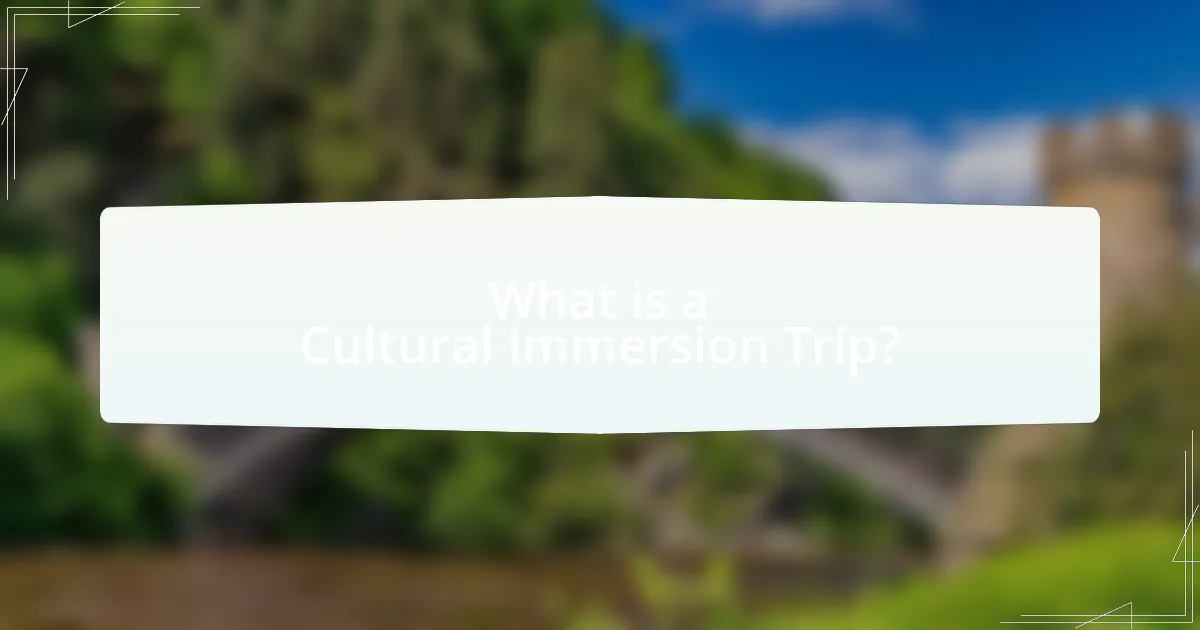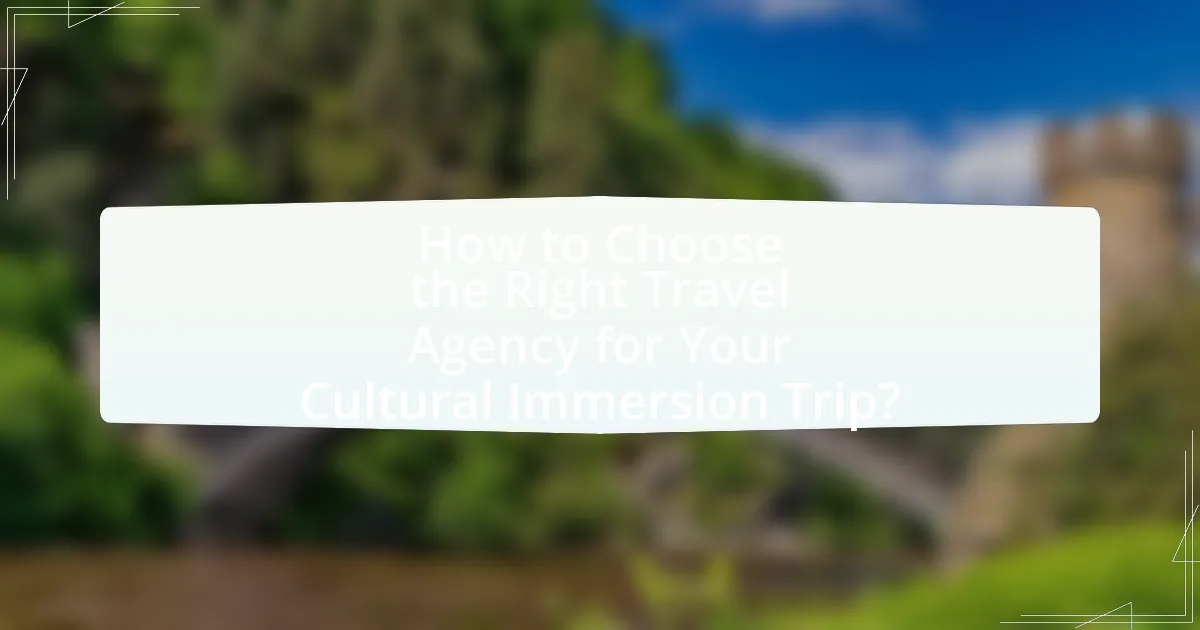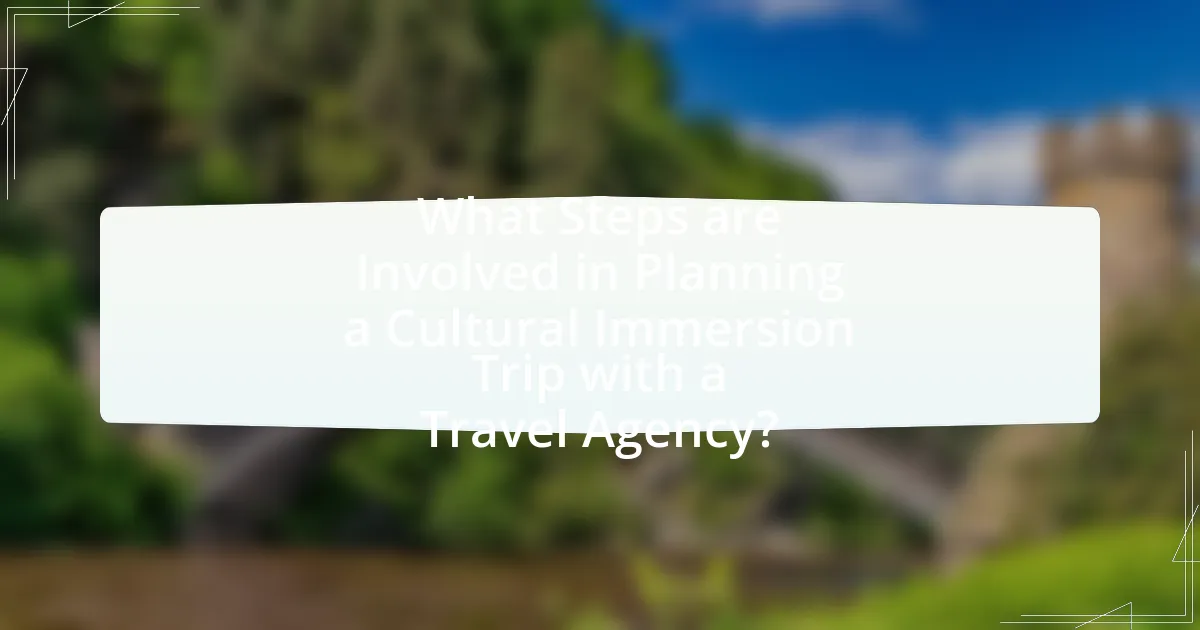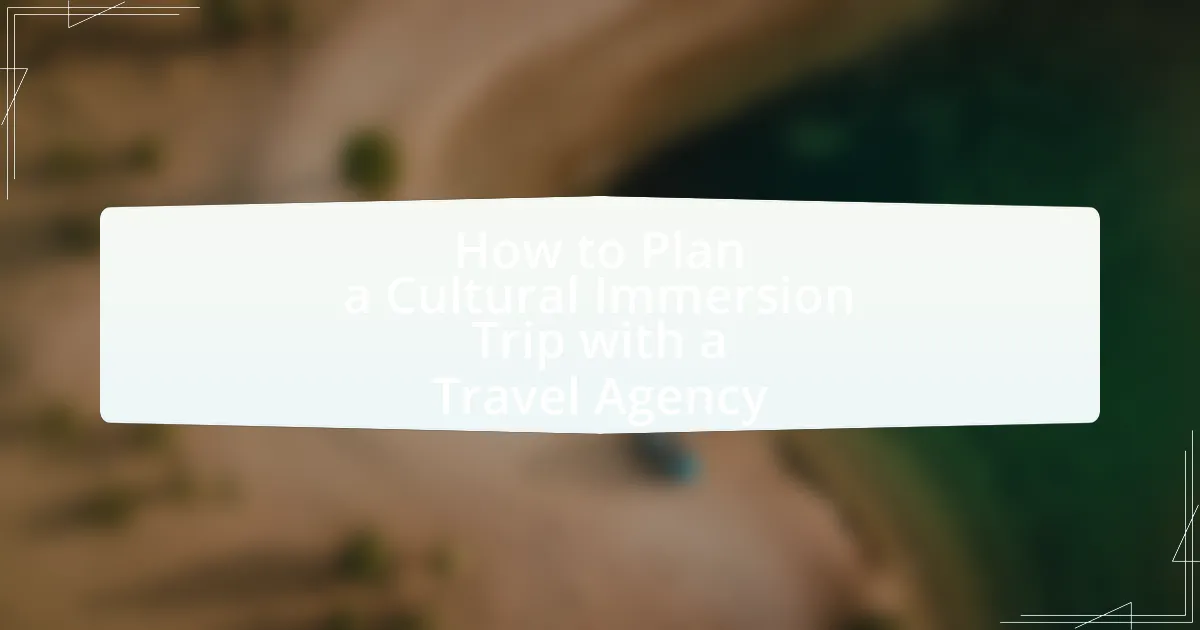A cultural immersion trip is a travel experience that allows participants to engage deeply with the local culture, traditions, and daily life of a specific community or country. This article outlines the differences between cultural immersion trips and regular travel, emphasizing the importance of authentic experiences and interactions with local residents. It details the role of travel agencies in planning these trips, including how to choose the right agency, assess their expertise, and create a tailored itinerary that balances guided activities with free exploration. Additionally, the article addresses common challenges in planning such trips and offers best practices for successful cultural engagement.

What is a Cultural Immersion Trip?
A cultural immersion trip is a travel experience designed to deeply engage participants with the local culture, traditions, and daily life of a specific community or country. These trips often include activities such as homestays, local workshops, and guided tours that emphasize authentic interactions with residents. Research indicates that cultural immersion can enhance understanding and appreciation of diverse cultures, as evidenced by studies showing increased cultural sensitivity among participants (Cultural Intelligence: A Guide to Working with People from Other Cultures, by Brooks Peterson).
How does a cultural immersion trip differ from regular travel?
A cultural immersion trip differs from regular travel in that it emphasizes deep engagement with local cultures, traditions, and communities rather than merely visiting tourist attractions. Cultural immersion trips often involve activities such as homestays, language classes, and participation in local customs, which foster authentic experiences and connections with residents. In contrast, regular travel typically focuses on sightseeing and leisure, where interactions with local culture may be superficial. Research indicates that immersive experiences can enhance cultural understanding and appreciation, as evidenced by studies showing that travelers who engage deeply with local communities report higher satisfaction and personal growth compared to those who follow conventional travel itineraries.
What experiences define a cultural immersion trip?
Cultural immersion trips are defined by experiences that allow travelers to engage deeply with the local culture, traditions, and daily life of a destination. These experiences typically include homestays with local families, participation in traditional festivals, cooking classes featuring regional cuisine, and guided tours led by local experts who share insights into the community’s history and customs. For instance, a study by the International Journal of Tourism Research highlights that travelers who participate in local customs and activities report higher satisfaction and a greater understanding of the culture. Such immersive experiences foster meaningful connections and enhance the overall travel experience.
Why are cultural immersion trips important for travelers?
Cultural immersion trips are important for travelers because they provide authentic experiences that foster deeper understanding and appreciation of different cultures. Engaging directly with local communities allows travelers to learn about customs, traditions, and lifestyles that are often overlooked in traditional tourism. Research indicates that immersive experiences can enhance cultural sensitivity and empathy, as evidenced by a study published in the Journal of Travel Research, which found that participants in cultural immersion programs reported increased intercultural competence and personal growth. This direct interaction not only enriches the travel experience but also promotes sustainable tourism practices by supporting local economies and preserving cultural heritage.
What role does a travel agency play in planning a cultural immersion trip?
A travel agency plays a crucial role in planning a cultural immersion trip by providing expertise in destination selection, itinerary development, and local connections. Travel agencies leverage their knowledge of cultural experiences, such as local festivals, culinary classes, and community interactions, to create personalized itineraries that enhance cultural engagement. For instance, a travel agency can arrange for travelers to participate in traditional ceremonies or workshops that are not typically accessible to the general public, thereby deepening the cultural experience. Additionally, travel agencies often have established relationships with local guides and service providers, ensuring that travelers receive authentic experiences and insights into the local culture.
How can a travel agency enhance the cultural experience?
A travel agency can enhance the cultural experience by offering personalized itineraries that include local interactions, authentic cuisine, and cultural workshops. By collaborating with local guides, agencies can provide travelers with insights into traditions, history, and customs that are not typically accessible through standard tourist activities. For example, a study by the World Tourism Organization indicates that immersive experiences, such as cooking classes or artisan workshops, significantly increase travelers’ understanding and appreciation of a destination’s culture. This approach not only enriches the travel experience but also supports local economies and preserves cultural heritage.
What services do travel agencies offer for cultural immersion trips?
Travel agencies offer a variety of services for cultural immersion trips, including itinerary planning, local guides, and cultural experiences. Itinerary planning involves customizing travel routes to include significant cultural sites and activities that reflect the local heritage. Local guides provide in-depth knowledge and insights about the culture, history, and traditions of the destination, enhancing the travel experience. Additionally, cultural experiences may include cooking classes, traditional performances, and community interactions, allowing travelers to engage authentically with the local culture. These services are designed to create a comprehensive and enriching travel experience that fosters a deeper understanding of the destination.

How to Choose the Right Travel Agency for Your Cultural Immersion Trip?
To choose the right travel agency for your cultural immersion trip, prioritize agencies that specialize in cultural experiences and have positive reviews from previous clients. Research agencies that offer tailored itineraries focusing on local customs, traditions, and interactions with local communities. Verify their credentials, such as affiliations with reputable travel organizations, and assess their knowledge of the destination’s culture. Agencies with established partnerships with local guides can enhance the authenticity of your experience. According to a 2021 survey by the American Society of Travel Advisors, 78% of travelers prefer agencies that provide personalized cultural experiences, indicating the importance of this specialization in agency selection.
What factors should you consider when selecting a travel agency?
When selecting a travel agency, consider their expertise in cultural immersion experiences. A travel agency specializing in cultural trips will have established connections with local communities, ensuring authentic experiences. Additionally, evaluate customer reviews and testimonials, as they provide insights into the agency’s reliability and service quality. Look for agencies that offer customizable itineraries, allowing for a tailored experience that meets specific cultural interests. Finally, assess the agency’s pricing structure and transparency, as clear pricing helps avoid unexpected costs during the trip.
How do reviews and testimonials influence your choice?
Reviews and testimonials significantly influence choice by providing social proof and insights into the experiences of others. When planning a cultural immersion trip with a travel agency, potential customers often rely on the feedback from previous travelers to gauge the quality and authenticity of the services offered. Research indicates that 79% of consumers trust online reviews as much as personal recommendations, highlighting their impact on decision-making. Positive testimonials can enhance credibility and encourage bookings, while negative reviews may deter potential clients, demonstrating the critical role of customer feedback in shaping choices.
What certifications or affiliations should a travel agency have?
A travel agency should have certifications such as the International Air Transport Association (IATA) accreditation and affiliations with organizations like the American Society of Travel Advisors (ASTA) or the Travel Leaders Network. These certifications and affiliations indicate that the agency meets industry standards, adheres to ethical practices, and has access to a wide range of travel resources. For example, IATA accreditation ensures that the agency can issue airline tickets and handle international travel transactions, while ASTA membership signifies a commitment to professionalism and consumer protection in travel services.
How can you assess the agency’s expertise in cultural immersion trips?
To assess an agency’s expertise in cultural immersion trips, review their experience, client testimonials, and the qualifications of their staff. Agencies with extensive experience often provide detailed itineraries that reflect deep cultural understanding, while positive client testimonials can indicate successful past trips. Additionally, staff qualifications, such as language proficiency and cultural training, further demonstrate the agency’s capability to deliver authentic experiences.
What questions should you ask the travel agency about their experience?
You should ask the travel agency about their experience by inquiring about the number of years they have been in business, the types of cultural immersion trips they specialize in, and the destinations they have successfully organized trips to. Additionally, ask for references or testimonials from previous clients who have taken similar trips, as this can provide insight into their expertise and reliability. For example, a travel agency with over ten years of experience and positive feedback from clients indicates a strong track record in planning cultural immersion trips.
How can you evaluate the agency’s cultural connections?
To evaluate the agency’s cultural connections, assess their partnerships with local communities and cultural organizations. Agencies that have established relationships with local artisans, cultural institutions, and community leaders demonstrate a commitment to authentic cultural experiences. For instance, an agency that collaborates with local guides or hosts workshops with indigenous artisans indicates a deeper cultural integration. Additionally, reviewing client testimonials and case studies can provide insights into the agency’s effectiveness in facilitating genuine cultural interactions, showcasing their ability to connect travelers with the local culture meaningfully.

What Steps are Involved in Planning a Cultural Immersion Trip with a Travel Agency?
Planning a cultural immersion trip with a travel agency involves several key steps. First, identify your cultural interests and desired destinations, which helps the agency tailor the experience to your preferences. Next, consult with the travel agency to discuss your budget, travel dates, and specific activities you wish to include, such as local workshops or guided tours. The agency will then create a customized itinerary that incorporates these elements, ensuring a balance of cultural experiences and leisure time. After reviewing and finalizing the itinerary, confirm all bookings, including accommodations, transportation, and activities. Finally, prepare for the trip by researching cultural norms and practices of the destination to enhance your immersion experience.
How do you communicate your travel goals to the agency?
To communicate travel goals to the agency, clearly outline your preferences, interests, and desired experiences. This includes specifying cultural aspects you wish to explore, such as local traditions, cuisine, and historical sites. Providing examples of previous trips or specific destinations can further clarify your expectations. For instance, if you are interested in culinary experiences, mention particular dishes or cooking classes you want to try. This direct communication ensures the agency can tailor the trip to meet your cultural immersion objectives effectively.
What specific cultural experiences do you want to include?
I want to include traditional cooking classes, local artisan workshops, and guided historical tours as specific cultural experiences. Traditional cooking classes allow travelers to learn about local cuisine and culinary techniques, enhancing their understanding of the culture. Local artisan workshops provide hands-on experiences with crafts unique to the region, fostering appreciation for traditional skills. Guided historical tours offer insights into the area’s history and heritage, enriching the travel experience with context and knowledge. These experiences are essential for a comprehensive cultural immersion trip.
How can you set a budget for your cultural immersion trip?
To set a budget for your cultural immersion trip, first determine your total available funds for the trip. This involves calculating your income, savings, and any additional financial resources you can allocate. Next, outline all potential expenses, including travel costs, accommodation, meals, activities, and cultural experiences. For instance, research average costs for flights, local transportation, and lodging in your destination to create a realistic estimate. Additionally, consider setting aside a contingency fund, typically 10-20% of your total budget, to cover unexpected expenses. By systematically assessing your financial situation and anticipated costs, you can establish a comprehensive budget that aligns with your cultural immersion goals.
What itinerary planning considerations should you discuss with the agency?
When planning an itinerary for a cultural immersion trip, you should discuss your travel goals, budget, preferred destinations, and activities with the agency. Clearly defining your travel goals helps the agency tailor the experience to your interests, such as historical sites, local cuisine, or community interactions. Establishing a budget ensures that the agency can recommend options that fit your financial constraints, while discussing preferred destinations allows for a focused itinerary that aligns with your cultural interests. Additionally, specifying activities, such as guided tours, workshops, or festivals, enables the agency to create a personalized experience that enhances cultural engagement.
How can you ensure a balance between guided activities and free exploration?
To ensure a balance between guided activities and free exploration during a cultural immersion trip, incorporate a structured itinerary that includes both organized tours and designated free time. Research indicates that travelers benefit from a mix of guided experiences, which provide context and insights, and unstructured time, which fosters personal discovery and engagement with the local culture. For instance, a study by the Adventure Travel Trade Association found that 70% of travelers prefer itineraries that allow for both guided tours and opportunities for independent exploration, enhancing overall satisfaction and cultural understanding.
What local customs and practices should be included in the itinerary?
Local customs and practices that should be included in the itinerary for a cultural immersion trip encompass traditional festivals, local cuisine experiences, and community engagement activities. For instance, participating in a local festival allows travelers to witness cultural expressions through music, dance, and rituals, which are integral to the community’s identity. Engaging in local cuisine experiences, such as cooking classes or food tours, provides insight into the region’s culinary heritage and ingredients, fostering a deeper appreciation for local traditions. Additionally, community engagement activities, such as volunteering or attending workshops led by local artisans, promote interaction with residents and enhance understanding of their daily lives and customs. These practices not only enrich the travel experience but also support local economies and cultural preservation.
What are the common challenges when planning a cultural immersion trip?
Common challenges when planning a cultural immersion trip include language barriers, cultural misunderstandings, and logistical issues. Language barriers can hinder communication and limit the ability to engage with locals, making it difficult to fully experience the culture. Cultural misunderstandings may arise from differing social norms and practices, potentially leading to unintentional offense or discomfort. Logistical issues, such as arranging transportation, accommodations, and activities that align with cultural experiences, can complicate the planning process and require careful coordination. These challenges necessitate thorough research and preparation to ensure a successful cultural immersion experience.
How can you address potential language barriers?
To address potential language barriers, utilize professional translation services and bilingual guides during the trip. These resources ensure clear communication and enhance the cultural experience by bridging language gaps. Studies indicate that travelers who engage with local languages through interpreters report higher satisfaction and deeper cultural understanding, as effective communication fosters meaningful interactions.
What strategies can help manage cultural differences?
Effective strategies to manage cultural differences include fostering open communication, promoting cultural awareness, and encouraging adaptability. Open communication allows individuals to express their perspectives and clarify misunderstandings, which is essential in diverse environments. Promoting cultural awareness through training and education helps participants understand and respect different cultural norms and values. Encouraging adaptability enables individuals to adjust their behaviors and expectations in response to cultural variations, facilitating smoother interactions. Research indicates that organizations that implement these strategies experience improved collaboration and reduced conflict, enhancing overall effectiveness in multicultural settings.
What are the best practices for a successful cultural immersion trip?
The best practices for a successful cultural immersion trip include thorough research, active participation, and respectful engagement with the local culture. Conducting comprehensive research about the destination helps travelers understand cultural norms, traditions, and language, which enhances the overall experience. Actively participating in local activities, such as cooking classes or community events, fosters deeper connections with residents and provides authentic insights into their way of life. Respectful engagement, which involves being mindful of local customs and practices, ensures that travelers do not inadvertently offend the host community. These practices are supported by studies indicating that immersive experiences lead to greater cultural understanding and personal growth, as highlighted in research by the Journal of Travel Research, which emphasizes the importance of cultural sensitivity in travel experiences.
How can you prepare yourself for cultural experiences?
To prepare yourself for cultural experiences, research the destination’s customs, traditions, and social norms. Understanding local etiquette, such as greetings and dining practices, enhances interactions and shows respect for the culture. For instance, knowing that in Japan, bowing is a common greeting can help you engage more meaningfully with locals. Additionally, learning basic phrases in the local language can facilitate communication and demonstrate your willingness to connect. Engaging with travel agencies that specialize in cultural immersion can provide tailored insights and resources, ensuring a more enriching experience.
What tips can enhance your engagement with local cultures?
To enhance engagement with local cultures, actively participate in community events and traditions. Engaging in local festivals, markets, and workshops allows for direct interaction with residents and a deeper understanding of their customs. For instance, attending a traditional dance or culinary class can provide insights into cultural practices and foster connections with locals. Additionally, learning basic phrases in the local language demonstrates respect and willingness to connect, which can lead to more meaningful exchanges. Research indicates that immersive experiences significantly increase cultural understanding and appreciation, as highlighted in studies by the Journal of Travel Research, which emphasize the benefits of experiential learning in travel.

Leave a Reply